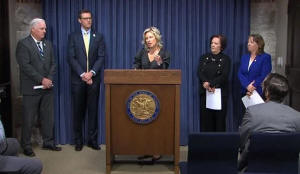|
GOP lawmakers were highly critical of how the budget was handled
last year, with little input from Republicans and little notice
before it was voted upon.
House Minority Leader Tony McCombie, R-Savanna, said crafting
the budget should be a bipartisan effort.
“The budget bills do not need to come forward in the final hours
of the session with little or no Republican input, and certainly
the budget shouldn’t be used as a political football, year after
year,” McCombie said.
State Rep. Norine Hammond, R-Macomb, the House Republican’s
chief budgeteer, would like Illinoisans to have a chance to
provide input in the process.
“Holding real meaningful budget hearings, which respect minority
voices, and provides for public input and transparency,” Hammond
said.
Hammond has introduced some of the caucus’ primary budget reform
ideas, including adopting a revenue estimate and a budget based
on that revenue estimate, and respecting the voters' decision to
reject the graduated income tax hike.
House Republicans also want to see tax reform, including
eliminating the franchise tax on employers, but State Rep. Will
Guzzardi, D-Chicago, said he would like to raise taxes for some
groups in the state that profited during the pandemic.
“A small handful of very wealthy people and very big businesses
profiteered off the hardship that the rest of us were facing, so
we think that those folks ought to pay what they owe,” Guzzardi
said.
Gov. J.B. Pritzker is expected to unveil his intentions for this
year’s budget when he delivers his State of the State address
later this month.
It remains to be seen if the state’s unfunded pension debts will
be addressed. Illinois’ five statewide pension systems had a
total unfunded liability of $140 billion in fiscal 2022.
Lawmakers have until the end of spring session to approve a
budget that is set to begin July 1.
Kevin Bessler reports on statewide issues in
Illinois for the Center Square. He has over 30 years of
experience in radio news reporting throughout the Midwest.
|
|




